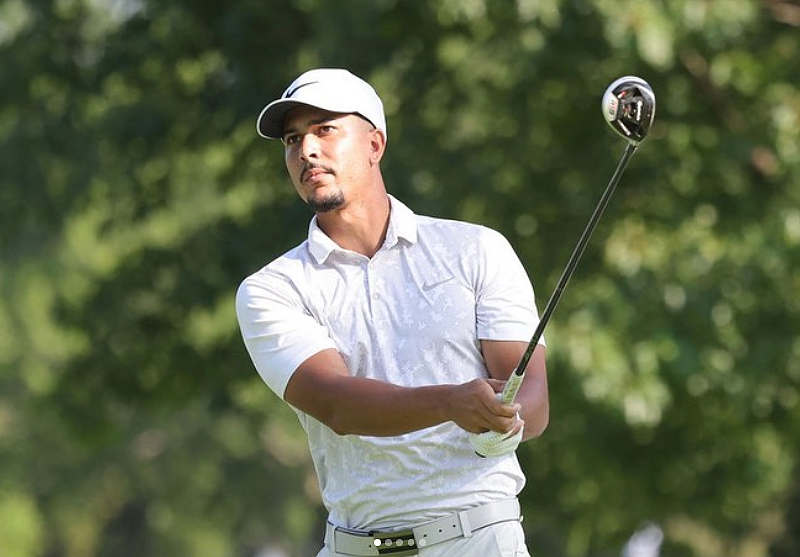
On a bright and sunny morning of October 18th, the stage was set for Aaron Beverly to engage with a group of corporate executives while diligently honing his skills for the Billy Horschel Invitational Presented by Cisco.
Having arrived at The Concession Golf Club in the picturesque Lakewood Ranch area, Beverly was there to compete for a share of the substantial $150,000 prize at the Advocates Professional Golf Association Tour event scheduled for October 18-19. This 29-year-old professional golfer, hailing from Sacramento, California, had a multitude of responsibilities on his plate.
Before the pro-am event kicked off, he was confronted with a question, a question that went beyond the realm of golfing proficiency.
“Do you consider yourself a golfer or a Black golfer?” was the query posed to Beverly.
Without a moment’s hesitation, he replied, “A Black golfer. It comes with an extra responsibility.”
The Era of Tiger Woods When Tiger Woods turned professional in 1996, it sparked a wave of hope across America. There was a prevailing belief that this dynamic and generation-defining star would break down the barriers that had previously excluded minority communities from the world of golf.
In 1997, the founding of The First Tee program set a parallel path, utilizing golf not only as a means to teach the game but also life skills. It often aimed at benefiting minority communities. The excitement generated by this movement was palpable.
“People were inspired by Tiger,” Beverly noted. “But the reality was different. In basketball, all you need is a ball and a pair of shoes to start playing. Golf requires clubs, a ball, a coach, and access to a place to play.”
In 1996, Tiger Woods stood alone as the PGA Tour’s sole Black player. With the likes of Calvin Peete, Jim Thorpe, and Jim Dent having moved to the senior tour, the progress towards diversifying golf was slow. Fast forward to 2023, and only four Black players possess PGA Tour status—Woods, Harold Varner III, Cameron Champ, and Joseph Bramlett. Progress had been moving at a snail’s pace.
In 2008, Kenneth Bentley, a former executive at Farmers and Nestle and a board member of Woods’ TGR Foundation, played a pivotal role in establishing the Advocates Professional Golf Association. This organization was formed with the mission of granting minorities access to top-notch equipment, instruction, opportunities, and, above all, to bring more diversity into the world of golf.
Billy Horschel, after witnessing the remarkable work of the APGA, decided to get involved. The Concession event marked the third consecutive year of his involvement as the tournament’s host.
Three years into his engagement, Horschel is optimistic about the change that is on the horizon.
Horschel pointed out, “All these guys now have sponsors on their shirts. Three years ago, there were none. It’s just a matter of time.”
But the question remains, can the APGA truly make a difference for this specific group of golfers, many of whom have gone through college programs and had access to substantial resources?
Yes, It Matters Troy Taylor II, a native of Columbus, Ohio, who graduated from the Michigan State golf program, firmly believes that the APGA will make a tremendous impact. Access to the nation’s premier golf courses, like The Concession, will not only enhance his comfort but will also prepare him for when it’s time to tee off in events such as the Korn Ferry or PGA Tour.
Horschel emphasized the importance of creativity and imagination, particularly in the context of chipping, which are essential skills that become profoundly magnified at higher levels of the sport. This sentiment holds true for all the other aspects of the game.
Taylor, who is 23 years old, also highlighted that every time he steps onto the golf course with the APGA, he doesn’t feel the pressure of “playing like it’s my last dollar.” For him, the APGA has become a supportive and nurturing home.
In addition to the golf itself, Horschel underscored that the players are treated with the same level of respect and support as PGA Tour members. This support system is a pivotal factor in moving forward. Each APGA golfer receives invaluable mentoring, financial education, access to coaches and trainers, and the opportunity to serve as ambassadors for tour sponsors, including Cisco, who has hired Beverly and Taylor as brand sponsors.
“Cisco has stepped up, and what this tour has done is give these guys a chance to make a name for themselves,” Horschel expressed. “There needs to be more recognition that there is a tour that is helping minorities realize a dream.”
The Dream of Playing at The Concession Many of the players who participated in the recent event harbored a dream of playing at The Concession, a course that gained notoriety after hosting the Workday Championship in 2021. Horschel, who finished in a tie for second place behind winner Collin Morikawa, could hardly contain his excitement. “I had heard all about The Concession for so many years,” he said. “I had never gotten to play it, and I had heard it requires a lot from the player.”
Cassidy’s Contribution During the 2021 tournament, Billy Horschel struck up a friendship with Bruce Cassidy Sr., the owner of The Concession, and his daughter, Sherry. Both shared his enthusiasm for the APGA and lent their support to his first two tournaments, held at The Players Stadium in Ponte Vedra Beach. When Horschel expressed his desire to move his tournament to The Concession, they eagerly welcomed the opportunity. Bruce Cassidy Sr. remarked, “I’ve tried to look at the bigger picture and find ways to give back. This got started because Billy fell in love with our facility.”
Cassidy took the proposal to host the APGA to his management team, staff, and members, and he received unwavering support. This decision coincided with The Concession’s preparations to host the inaugural World Champions Cup, a Champions Tour event scheduled for December 7, 8, and 10. The event would see European, International, and American teams competing. The synergy created an electrifying atmosphere for the APGA, which this season hosts 18 events with a total purse of $1 million.
A Lifeline for Minority Golfers The APGA has proven to be a vital resource for minority golfers, particularly at a time when the lack of funding can overshadow talent. Horschel’s love for the game and the APGA’s mission to connect people have made a significant impact.
Horschel noted, “If the finances are not available, it can be tough to achieve your dreams. This sport is expensive. A lot of smart people are trying to find ways to help, but it still costs a lot of money. In the last decade, I see clubs making changes, municipal golf courses making a concerted effort to open doors to young golfers and minorities. They have the opportunity to inspire kids and provide them with a platform.”
The APGA, indeed, provides minority golfers with a valuable platform. Taylor emphasized that the true impact of the APGA may not be fully visible until the future, when more minorities participate in the PGA Tour, and more minority children are watching and getting their hands on a golf club.
“How many more people will get their hands on a golf club?” Taylor pondered.
The Power of Representation Cole Smith, the executive director of the APGA Tour, emphasized that golf fans won’t have to wait long to witness the difference one golfer can make. Tim O’Neal, a regular player on the APGA Tour, secured a spot on the Champions Tour this season and earned $466,336. He is quickly becoming a fan favorite on the Champions Tour.
Smith shared a telling anecdote about two young golfers discussing O’Neal’s success. One of them said to the other, “I always wanted to play on the APGA Tour.”
This is about representation, as Beverly pointed out. To be inspired, one has to see themselves in someone else. Kids will now see them as players.
The APGA’s Influence at The Concession The power and influence of the APGA were on full display at The Concession. Gabriel Lench, a Latino golfer from St. Mary, who had been a successful amateur golfer in Florida before turning professional in 2019, won the event by a single stroke and received a winner’s check of $50,000.
With tears in his eyes, Lench described what the APGA Tour meant to him. “You don’t know me,” he addressed the audience during the winner’s ceremony. “I don’t come from anything. I have $200 in the bank and $20,000 in credit card debt. And if I didn’t do something this year, it was over for me.”
Thanks to the Billy Horschel Invitational and the APGA, Lench’s dream of making it to the PGA Tour remains alive and well.

